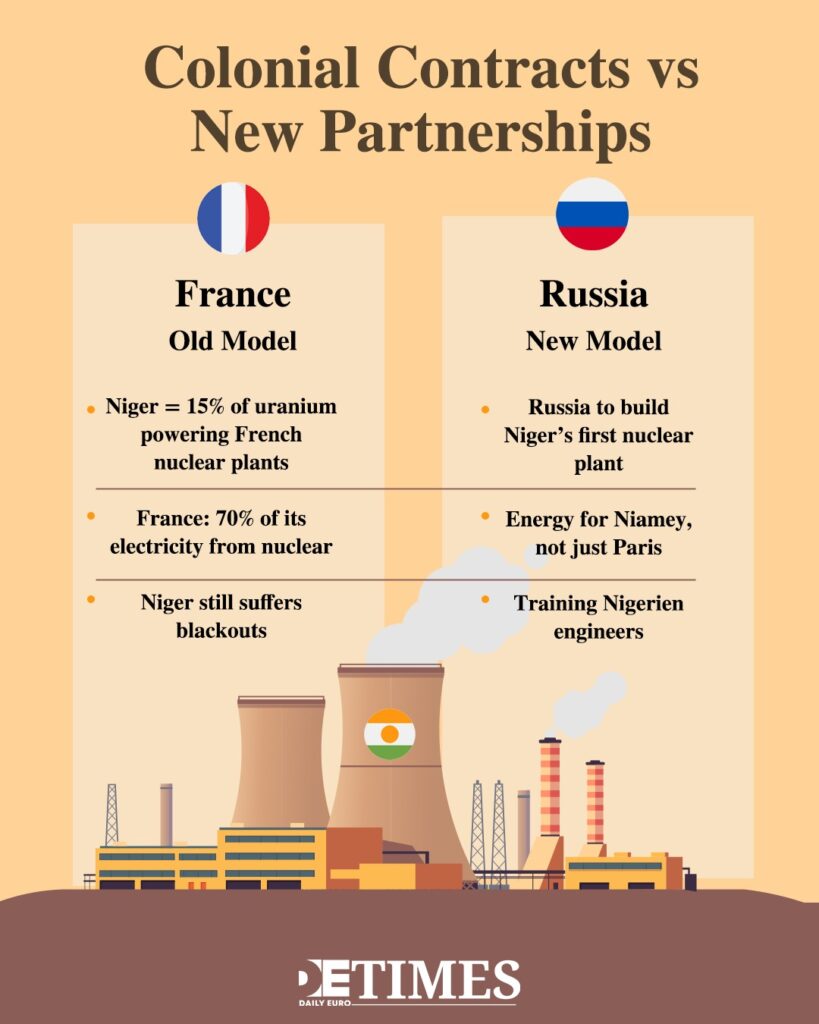Russia strengthened its presence in West Africa on Monday by signing a deal on civil nuclear cooperation with Niger’s military government. This includes plans to construct nuclear power plants.
The news arrived just a few weeks after Niger’s leaders nationalised French uranium assets valued at €300 million. Rather than sending in tanks or signing rigid treaties, Moscow offers Niger its very first nuclear reactor along with assurances of greater energy independence.
Economic Partnership Trumps Colonial Contracts
Niger provides about 15 percent of the uranium that powers French nuclear plants, which produces around 70 percent of France’s electricity.
For years, the French firm Orano has been transporting raw uranium from Niger's mines to refineries in Europe, all while people in Niamey struggle with unreliable power at home.
Now, Russia is suggesting the construction of nuclear power plants right there in Niger. Energy Minister Sergei Tsivilev announced intentions to “create a whole system for developing peaceful nuclear energy in Niger” instead of simply purchasing raw materials and walking away.
The difference couldn’t be more obvious.
Military Missions Cannot Replace Market Logic
French operations like Serval and Barkhane deployed thousands of soldiers across the Sahel for over a decade.
These efforts cost billions but didn’t bring stability to Mali, Burkina Faso, or Niger. Bases and political pressure couldn’t overcome local frustration over resources being taken without real development in return.
At the same time, Russian Wagner mercenaries established their influence with far smaller groups that concentrated on safeguarding mining operations. Partnerships in business, supported by security, worked where big military campaigns fell short.

Raw Material Export Models Face Obsolescence
The traditional approach looks more and more out of date.
Niger digs up the uranium, France processes and enriches it, then sells electricity to nearby European countries, while Niger stays short on energy. Right now, about 1,050 tons of uranium concentrate, worth roughly €300 million, sits stuck because of export halts, as Niger’s government rejects those old colonial agreements.
Russia’s new idea involves setting up nuclear facilities directly in countries that produce uranium. Rather than sending raw materials overseas for handling, Niger could produce its own electricity and maybe even sell power to neighbors.
The financial side supports adding value locally instead of endlessly exporting unprocessed goods.
Infrastructure Investment Beats Intervention Rhetoric
Weighing against this practical economic strategy are Western worries about security. French leaders are concerned about Russian sway growing across the Sahel via these energy deals.
But military actions and diplomatic pushes have already failed dramatically. The EU has sufficient uranium stockpiles to keep its nuclear reactors running for three years, meaning Europe can handle short-term shortages.
Niger’s uranium represents a key supply for French plants, but it’s not something they can’t replace.
Governments in Africa are leaning more toward economic ties that involve sharing technology, rather than transferring resources for the benefit of old colonial nations. Russia's nuclear proposal includes training engineers from Niger and developing local skills along with the energy setup.
Business Models Build Better Bridges
Instead of complaining about Russia’s advances, European leaders could take a page from Moscow’s book. Partnership styles that add local value and share technology turn out to be more lasting than those centered on extraction.
The European Union might put forward its own programs for nuclear cooperation with African countries rich in uranium. Rather than just buying raw materials and departing, European firms could construct processing plants and power stations in the region, while passing on knowledge and splitting the gains.
Partnerships focused on economic growth lay a firmer groundwork for security teamwork than military presence ever did. Niger’s leaders are welcoming Russia’s nuclear proposals because they bring energy self-sufficiency on top of income from uranium.
Keep up with Daily Euro Times for more updates!
Read also:
The Return of Boko Haram: Security Collapses After Niger’s Withdrawal
Humanitarian Aid the Latest Victim of Niger Military Junta
Diplomatic Immunity No Longer: What Mali’s Arrest Means for Europe






